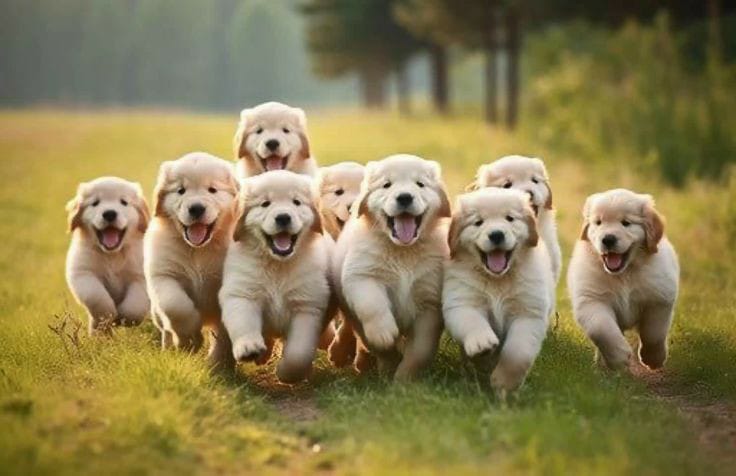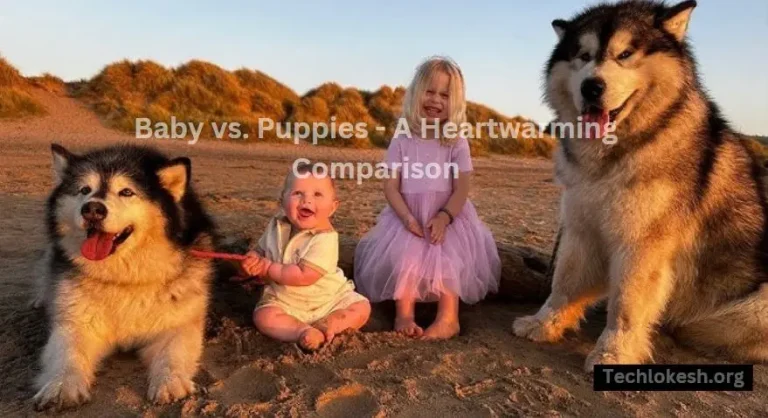Few things can rival the heartwarming sight of a baby or a playful puppy regarding cuteness overload. Both evoke joy, tenderness, and affection, capturing our hearts with their innocence and charm. Whether it’s the cooing of a baby or the wagging tail of a puppy, these two bring happiness in their unique ways. While each has its special place in our lives, comparing babies and puppies offers an intriguing exploration into the attributes that make them irresistible to people of all ages.
The Beginning of Life: Babies
From the moment they are born, babies enter a world filled with new and captivating sensations. Their early stages of life are characterized by rapid development and natural curiosity. From the instant they open their eyes, babies begin to explore their surroundings, relying on their senses to understand and learn about the world around them.
Physical Development
In the first few months of life, infants experience significant physical changes as they gain control over their muscles. They learn to lift their heads, grasp objects, and eventually crawl and walk. Each milestone reflects their resilience and determination, marking significant progress in their development. The growth of motor skills during this period is vital, as it forms the foundation for more complex movements and abilities later in life.
Cognitive Growth
Cognitive development in infants is equally remarkable. They begin to recognize faces, respond to sounds, and express various emotions. Babies learn through observation and interaction, absorbing information with incredible efficiency. Their brains are highly active, constantly forming connections and laying the groundwork for language, problem-solving, and social skills.
The Joy of Puppies
Puppies, much like infants, are bundles of energy and curiosity. They enter the world intending to explore, play, and form bonds. While their development differs from that of human babies, it is fascinating in its own right as they increase and adapt to their surroundings.
Physical Growth
Puppies develop rapidly, transforming from tiny, helpless creatures into agile and energetic young dogs within a few months. Their physical growth involves gaining strength, coordination, and the ability to perform various movements. Play is crucial in this process, helping puppies refine their skills and build muscle.
Learning and Socialization
Puppies are born with an instinct to learn and adapt. Socialization is a critical aspect of their early life, teaching them how to interact with other dogs and humans. Positive experiences during this period are essential, shaping the puppy’s behavior and temperament. Training and socialization go hand in hand, imparting basic commands and proper manners to young dogs.

Commonalities Between Babies and Puppies
Though they belong to different species, babies and puppies share traits that make them equally endearing to humans. Their behaviors and needs often mirror each other, highlighting the universal aspects of early development in mammals.
Curiosity and Exploration
Both babies and puppies are naturally curious. They explore their environments with a sense of wonder, eager to learn about the world around them. This curiosity is crucial for their development, driving them to discover new things and gain valuable experiences.
Dependence on Caregivers
Babies and puppies rely heavily on their caregivers in their early stages of life. This involves parents or guardians who nourish, protect, and love babies. Puppies initially depend on their mothers but quickly form bonds with their human caregivers. This dependence fosters solid emotional connections and a sense of security.
Play and Interaction
Play is a fundamental part of development for both babies and puppies. Through play, they learn about their bodies, develop coordination, and understand social cues. Interaction with others is also essential, helping them build relationships and learn appropriate behaviors.
Differences in Development
While there are many similarities, the developmental paths of babies and puppies diverge significantly. Understanding these differences can offer insights into the unique challenges and joys of raising both.
Rate of Growth
One of the most significant differences between babies and puppies is the rate at which they grow. Puppies mature much faster than human babies. Within a year, most puppies reach full physical maturity, while human children are still in the early stages of development. This rapid growth makes the early months particularly crucial for puppies regarding training and socialization.
Communication
Communication methods differ significantly between babies and puppies. Human babies gradually learn to speak, beginning with simple sounds and progressing to words and sentences, which can take several years. On the other hand, puppies primarily communicate through body language, vocalizations like barking or whining, and scent marking. Understanding these communication methods is critical to effective interaction and training.
Lifespan and Longevity
The lifespan of dogs is much shorter than that of humans. While a dog’s life expectancy varies by breed, most dogs live between 10 to 15 years. Human children, however, grow into adults and may live for several decades. This difference in lifespan means that the time spent raising and caring for a puppy is relatively brief but often intense.
The Emotional Connection
The bond between humans and their babies or puppies is profound, rooted in deep emotional ties built on trust, care, and mutual affection.
Attachment and Bonding
Both babies and puppies form strong attachments to their caregivers. For babies, this bond is often established through physical closeness, such as holding and feeding. Puppies develop attachments through consistent care, play, and training. These bonds are essential for the emotional well-being of both the caregiver and the child, whether human or canine.
The Joy of Milestones
Witnessing milestones is a joyous part of raising both babies and puppies. Babies’ milestones include their first smile, first steps, or words. For puppies, milestones include successfully responding to a command, learning to fetch, or completing house training. Each achievement brings pride and happiness to caregivers, marking significant progress and growth.
Health and Nutrition
Proper health and nutrition are crucial for the development of babies and puppies. Caregivers have a fundamental responsibility to ensure that they receive the right nutrients and care.
Nutritional Needs
Babies require a balanced diet of essential nutrients to support their rapid growth and development. Breastfeeding or formula provides the necessary nutrients in the early months, followed by the gradual introduction of solid foods. Puppies also need a diet that supports their quick growth, typically consisting of specially formulated puppy food rich in proteins and essential vitamins.

Regular Check-Ups
Routine medical check-ups are vital for monitoring the health of both babies and puppies. For babies, this includes vaccinations, growth assessments, and developmental screenings. Puppies require regular visits to the veterinarian for vaccinations, parasite prevention, and general health evaluations. These check-ups help identify and address potential health issues early, ensuring proper care and development.
Challenges and Rewards
Raising a baby or a puppy comes with its own set of challenges and rewards. Understanding and anticipating these can help caregivers provide the best possible care.
Sleepless Nights and Training
Both babies and puppies can lead to sleepless nights for their caregivers. Babies may wake frequently for feeding and comfort, while puppies might whine or need to go outside. Patience and consistency are crucial during these early stages. Training puppies demands dedication and time as they learn house rules and basic commands. The effort invested in these early stages ultimately pays off in the form of a well-adjusted child or a well-behaved dog.
Unconditional Love and Joy
The unconditional love and joy babies and puppies bring into our lives are immeasurable. Their presence can brighten even the darkest days, offering companionship and emotional support. The bond formed with a baby or a puppy is unique and deeply fulfilling, making all the challenges worthwhile.
Frequently Asked Questions
What are the critical differences in the developmental stages of babies and puppies?
Babies develop more slowly, with milestones such as crawling, walking, and talking occurring over the first few years of life. Puppies, on the other hand, mature much faster, reaching physical and behavioral milestones like walking, house training, and following basic commands within their first year.
How do the nutritional needs of babies and puppies differ?
Babies initially rely on breast milk or formula, gradually transitioning to solid foods rich in essential nutrients. Puppies require a diet specifically formulated for their rapid growth, usually high in protein and other nutrients vital for their development.
What are some similarities between raising a baby and raising a puppy?
Both require constant care, attention, and nurturing. They depend on their caregivers for food, safety, and emotional support. Additionally, both benefit from regular routines, socialization, and positive reinforcement during their early stages of development.
How do sleep patterns differ between babies and puppies?
Babies may wake frequently during the night for feeding or comfort, especially in the first few months. Puppies also have irregular sleep patterns early on, often waking up to go outside or seek attention, though they generally begin sleeping through the night sooner than babies.
What is the importance of regular check-ups for babies and puppies?
Regular check-ups are crucial for monitoring babies’ and puppies’ health and development. For babies, this includes vaccinations and developmental screenings. For puppies, it involves veterinary visits for vaccinations, parasite prevention, and overall health assessments.
How can I balance the demands of caring for both a baby and a puppy?
Time management and establishing routines are crucial to balancing the care of a baby and a puppy. Prioritizing tasks, seeking help when needed, and ensuring that the baby and the puppy receive adequate attention and care can help manage the challenges.
What are the benefits of raising a child alongside a puppy?
Raising a child with a puppy can foster a sense of responsibility, empathy, and companionship in the child. A child and puppy bond can provide emotional support, enhance social skills, and contribute to a nurturing environment.
What should I consider before introducing a puppy into a home with a baby?
Consider the puppy’s temperament, the baby’s safety, and the ability to manage the needs of both. To foster a safe and positive relationship, it’s essential to ensure that the puppy is well-socialized and that the baby is supervised during interactions with the puppy.
Conclusion
Despite their differences, babies and puppies share many qualities that make them irresistible to humans. Their curiosity, dependence, and ability to form strong emotional bonds are universal traits that underscore the beauty of early life. Raising a child or a puppy fills the experience with joy, challenges, and deep emotional connections. The journey of watching them grow and develop is one of life’s most rewarding experiences, offering a profound sense of purpose and happiness.

